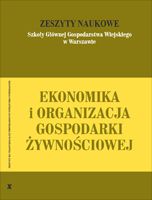Main Article Content
Article Details
ELSTRAND E.: Norwegian experience from extension work in farm management. Zeszyty Problemowe Postępów Nauk Rolniczych, Warszawa 1970.
KAMERSCHEN D.R., McKENZIE R.B., NARDINELLI G.: Ekonomia. Wydawnictwo Fundacja Gospodarcza NSZZ "Solidarność:". Gdańsk 1992.
KWIATKOWSKI S.: Przedsiębiorczość intelektualna. Wydawnictwo Naukowe PWN, Warszawa 2000.
MOSIEJ G.: Integracja Polski z UE a wyzwania cywilizacji informacyjnej. Wspólnoty Europejskie 2001, nr 7-8.
NARSKI Z.: Ekonomia rozwoju. Historia myśli ekonomicznej. Wydawnictwo Suspens, Toruń 2001.
Raport z wyników Powszechnego Spisu Rolnego 2002. GUS, Warszawa 2003.
RICARDO G.: Zasady ekonomii politycznej i opodatkowania. Warszawa 1957.
RYBAK M.: Zarządzanie kapitałem ludzkim a kluczowe kompetencje, (w:) Kapitał ludzki a konkurencyjność przedsiębiorstw, red. M. Rybak. Wydawnictwo Poltext, Warszawa 2003.
STANKIEWICZ W.: Historia myśli ekonomicznej. Wydawnictwo PWE, Warszawa 2000.
Systematyka i charakterystyka gospodarstw rolnych. GUS, Warszawa 2003.
WIATRAK A.P.: Wiedza i kapitał intelektualny jako źródło nierówności gospodarczych i społecznych, (w:) Nierówności społeczne a wzrost gospodarczy. Kapitał ludzki i intelektualny, red. M.G. Woźniak, cz. 2. Wydawnictwo Uniwersytetu Rzeszowskiego, Rzeszów 2005.
WOŁOSZYN J.: Ekonomiczne i społeczne determinanty rozwoju szkolnictwa rolniczego w Polsce. Wydawnictwo SGGW, Warszawa 2002.
WOŁOSZYN J.: Wiedza istotnym zasobem w rolnictwie. Problemy Rolnictwa Światowego. Aktualne tendencje w międzynarodowych stosunkach gospodarczych w rolnictwie i gospodarce żywnościowej. T. XII. Wydawnictwo SGGW, Warszawa 2004.
Wybrane elementy sytuacji ekonomicznej gospodarstw rolnych 2002. GUS, Warszawa, grudzień 2003.





